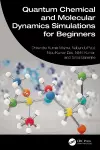
Quantum Chemical and Molecular Dynamics Simulations for Beginners
5 authors - Hardback
£91.99
Tamal Banerjee is currently a Professor at the Department of Chemical Engineering, Indian Institute of Technology Guwahati. He was associated as a Supplemental Faculty in the Department of Chemical and Biomolecular Engineering at University of Delaware, USA from 2011-2012. He also served as a University Associate in Curtin University, Perth, Australia from 2020-2024. Overall he has authored three books (CRC and Elsevier) and around 200 publications. His group has till date contributed around 900 data points related to the thermodynamic Data Points for Ionic Liquid (IL) and Deep Eutectic Solvents(DES) mixture and is now available in NIST. Overall he has guided twenty doctorate students where most of them are involved in the application of green solvents within energy and environmental domain. He was also awarded the INDO-US Fellowship in 2011 in the field of Engineering Sciences. He is currently the Fellow of Royal Society of Chemistry, Indian Institute of Chemical Engineers and Indian Chemical Society. He also serves in the Editorial Boards of Fluid Phase Equilibria, Journal of Solution Chemistry and is the Associate Editor of Thermal Advances. His group uses both Quantum Chemical and Molecular Dynamics methods to predict thermodynamic and transport properties of IL and DES. His interests lie in the COnductor like Screening MOdel (COSMO) based methods and Molecular Modelling Techniques which includes both classical Molecular Dynamics and Reactive Force Field simulations (ReaxFF). Application area includes both renewable (alcohols) and non-renewable (coal and chemical hydrides) energy sources.
Dhirendra Kumar Mishra earned a Doctorate in Chemical Engineering from the Indian Institute of Technology, Guwahati, Assam, India. During his doctoral studies, he specifically concentrated on the integration of ionic liquids and eutectic solvents in the field of hydrogen storage as a catalytic solvent. His study involved utilizing experimental and computational chemistry simulations to comprehend and improve the effectiveness of ionic liquids and eutectic mixtures for practical usage. His research interests span multiple areas, including computational chemistry for energy-related applications, green and sustainable solvents, hydrogen storage, and nanofluids for thermal applications. He is currently a postdoctoral fellow at the Joint BioEnergy Institute, affiliated with Sandia National Laboratories, where his research focuses on improving the process of catalytic lignin depolymerization using solvents and heterogeneous catalysts through experimental and computational approaches. He has published more than 10 research papers in journals with high impact factors, including Chemical Reviews, ACS Sustainable Chemistry and Engineering, Journal of Physical Chemistry A, International Journal of Hydrogen Energy, and Journal of Energy Storage.
Nikhil Kumar is a postdoc researcher from Sandia National Laboratories who is currently working in the Predictive Deconstruction at the Department of Energy funded Joint BioEnergy Institute (JBEI). Dr. Kumar received his Ph.D. in 2023 from the Department of Chemical Engineering at the Indian Institute of Technology Guwahati, India. Dr. Kumar's research area is primarily focused on the development of novel green solvents for aromatic compounds extraction and understanding of liquid structure of Deep Eutectic Solvents (molecular dynamics, quantum chemical, and COSMO-RS model simulations). Dr. Kumar's research interest also covers leveraging both machine learning and first-principles physics-based methods to make improved predictions for solvents for improved biomass conversion, utilization of CO2 for circular economy, and thermodynamic property predictions using various machine learning and Artificial intelligence models. Dr. Kumar has coauthored a book and 10+ research articles in leading academic journals, contributed to >10 conferences.
Nabendu Paul earned his Doctorate degree from the Indian Institute of Technology Guwahati in the year 2023. Subsequently, he joined the Maulana Azad National Institute of Technology (MANIT) Bhopal, and has been continuing as an Assistant Professor at the Department of Chemical Engineering since January 2024. He obtained his M. Tech and B. Tech degrees in Chemical Engineering from the National Institute of Technology Agartala, in 2015 and 2013, respectively. His research encompasses a wide range of interdisciplinary domains, including ionic liquids and deep eutectic solvents (green solvents), extraction and recovery of pharmaceuticals and biomolecules from aqueous environments, molecular dynamics and quantum chemical calculations, and the study of non-covalent interactions. His work further extends to ionic liquid-based systems for environmental and biological applications, such as drug delivery, direct air capture (DAC) of CO₂, and the development of eutectogels, ionogels, and DES-based electrolytes for supercapacitors. Recently, his group has initiated studies on the antibacterial potential of DESs in wound healing membranes. He has published over 8 articles in reputed peer-reviewed Journals. He has also authored a book that discusses the theoretical correlations and molecular dynamics aspects of deep eutectic solvents in environmental applications. Along with these, he has also published several book chapters and conference papers. His work integrates both experimental and computational approaches and contributes to advancing sustainable and functional material systems in chemical and environmental engineering.
Nipu Kumar Das received his Doctorate degree in 2025 from the Indian Institute of Technology, Guwahati, Assam, India in Chemical Engineering discipline. During his PhD journey, Das mainly focuses on the deep eutectic solvent based thermal fluid and solubility studies of different natural deep eutectic solvent. His study involved both experimental and computational chemistry to understand the mechanism of solvent compounds with nanoparticles. His other research spread in the area of green nanoparticles, energy related applications, COSMO-SAC, corrosion inhibitor and sustainable solvent. He has published more than 13 research papers in journals with high impact factors, including Journal of Molecular liquid, ACS Sustainable Chemistry and Engineering, AICHE, Journal of Industrial Crops and Products and Journal of Energy Storage.